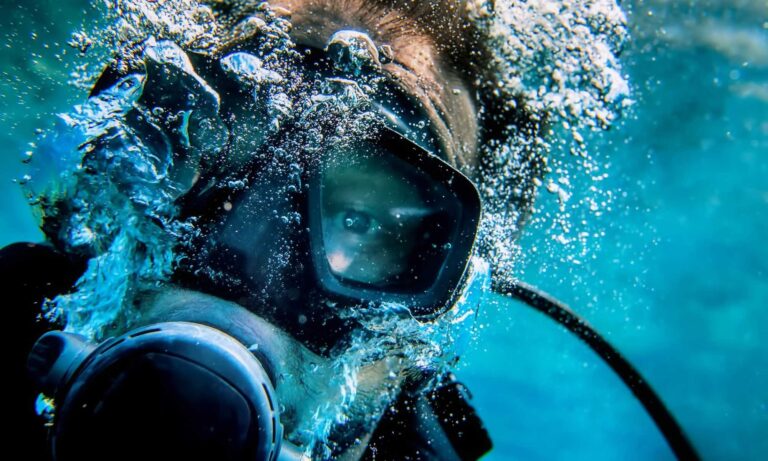Divers know about nitrogen narcosis. It happens when you go deep under water and have too much of the gas in your blood. What does it do? It makes people feel funny so they need to come up to the surface.
Table of Contents
Nitrogen Narcosis Definition
When people dive in the water, they can get a feeling like they are drunk. This is called nitrogen narcosis and it starts at around 100 feet of water.
What is nitrogen narcosis?
Commonly referred to as nitrogen narcosis, it is now often referred to by the more accurate name of inert gas narcosis. It has been found that other gasses than nitrogen can also cause this effect.
Some even argue that any gas, save for a few such as helium, can cause this effect.
Divers often refer to the safety mechanism of inert gas narcosis as “the martini effect” or “Martini’s Law” because it is supposedly comparable to drinking one dry martini for every 10 meters/33 feet descended beyond the first 20 meters.
Nitrogen Narcosis Symptoms
Symptoms of Nitrogen Narcosis include
- Dizziness
- Emotional reactions such as lightheadedness
- Elation
- Euphoria
- Anxiety
Severe cases may also cause illnesses that are debilitating, like paralysis and blindness. The most severe cases can lead to death.
Who gets Nitrogen Narcosis?
Narcosis, a type of decompression sickness that is the result of breathing air at shallow depths, can occur in all divers who descend below 20 metres. However, the severity varies from diver to diver and even for divers on a different dive. The reasons are not entirely understood.
Diving experience can help divers learn to manage the effects of inert gas narcosis, but no one has been able to develop actual tolerance.
What causes Nitrogen Narcosis?
The full cause of inert gas narcosis is unknown, but it is believed that this feeling arises from a reaction between different gases in breathable air with your body’s lipid tissues.
As lipid tissues make up the majority of our brains, the effects are mostly felt here.
As depth increases, the adverse effects of deep diving become more noticeable. Around 100 feet-30 meters, most divers will notice some effects happening. At this point, the adverse effects intensify and are much more severe at 140 feet or 40 meters in depth.
Recreational diving is usually limited to depths less than 40 meters/140 feet, due in part to risks of decompression illness and the risk for oxygen toxicity.
Nitrogen narcosis treatment?
The symptoms will subside after a dive to a shallower depth, with no long-term effects.
Whether or not it’s possible to continue your dive at a subsequent depth is a consideration whether you are switching times of day, escaping bad weather, or addressing air consumption.
However, because of the feeling of euphoria often caused by the narcosis, an affected diver may not be able to realize they are affected. Consequently, they will likely keep diving deeper until someone else intervenes.
Because of this, it is important that buddies on deep dives looks out for each other and watches for any indications of inert gas narcosis.
If you notice these symptoms with your buddy, encourage them to return to shallower water.
Don’t go Deep Diving alone
Nitrogen narcosis is a potentially dangerous condition that can be easily managed.
When new divers first undertake deep dives, they should always have an experienced buddy with them to help mitigate the “Martini’s Law” effect.
Conclusion
I know it’s hard to believe, but when you go really deep under water and have too much of the gas in your blood, it can make people feel funny. If this sounds like something that could happen to divers who are underwater for a long time, then don’t worry because there is a solution! The only thing they need to do is come back up on the surface where everything will be okay again. It makes sense why divers would want this information before going down into the ocean depths- so they know what might happen if they stay down too long or dive below their limits. And with all these benefits for being aware of nitrogen narcosis as a diver, we hope you take our advice and always

